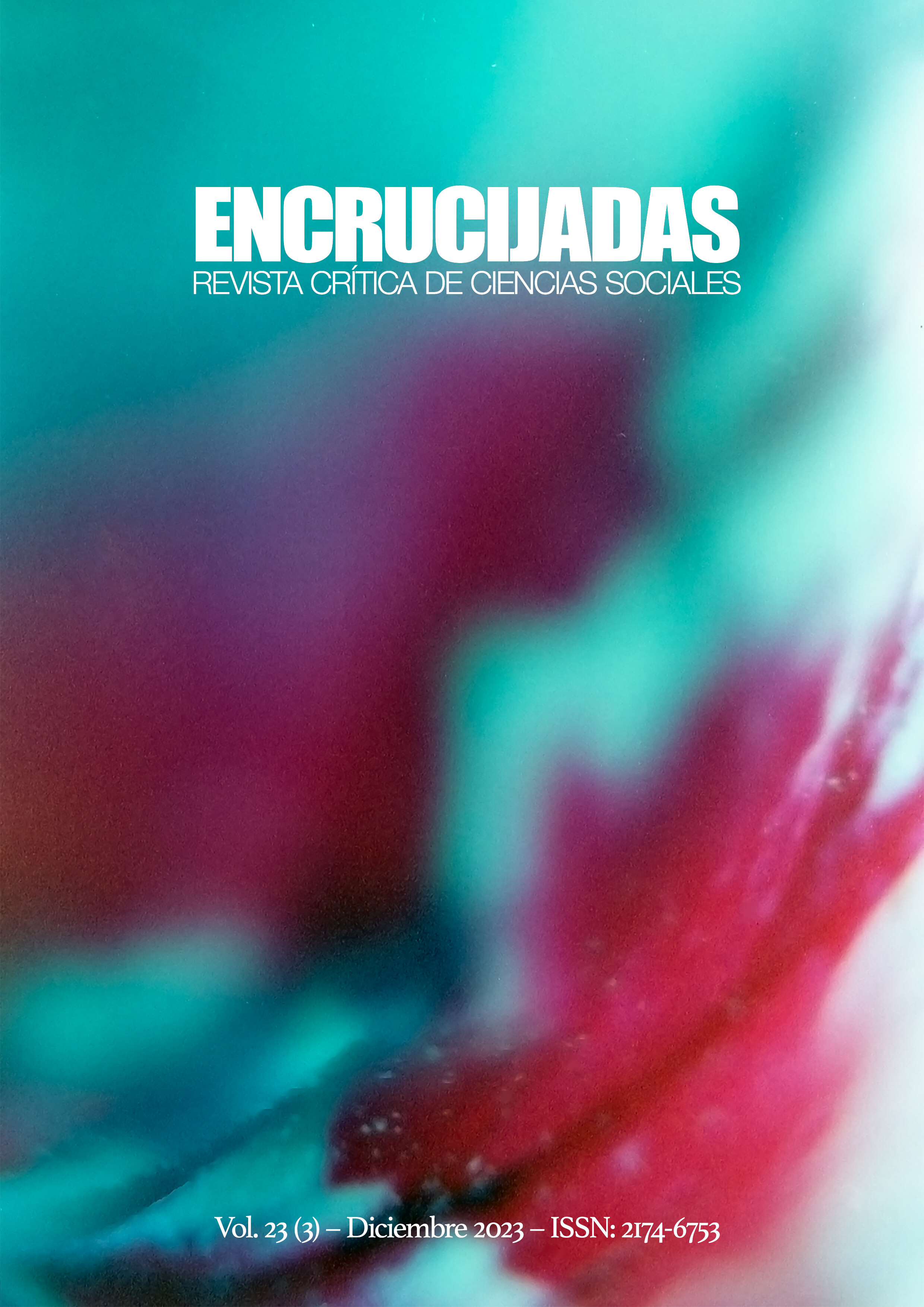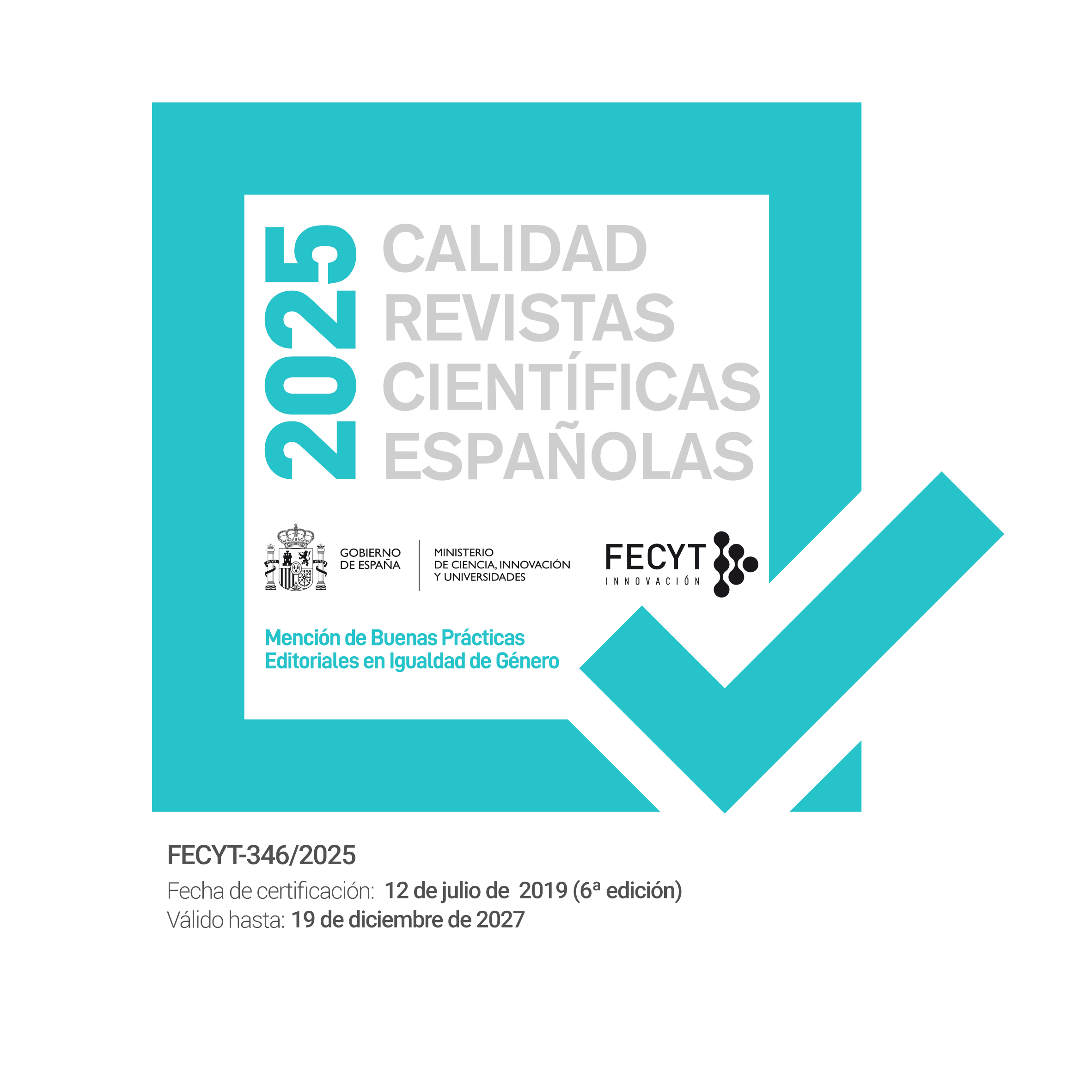Conceptos carnales en acción: la sociología diagonal de Loïc Wacquant
Palabras clave:
Bourdieu, teoría, reflexividad, estado penal, dominación racial, sociología carnalResumen
Escrito en forma de diálogo con el sociólogo bruselense Dieter Vandebroeck, este artículo recorre la trayectoria social e intelectual de Loïc Wacquant como trampolín para revisar y discutir los principales conceptos acuñados y las proposiciones teóricas elaboradas en el curso de sus investigaciones sobre la marginalidad urbana comparada, la dominación racial, el gueto, el Estado penal, el neoliberalismo y la carnalidad. Esto brinda una oportunidad para especificar las relaciones entre etnografía, historia y teoría; la dialéctica de la dominación y la resistencia; el papel del (des)honor público en la vida social; los usos del campo burocrático de Bourdieu; y las condiciones sociales y académicas de incubación, difusión y muerte de mitos académicos como el de la "infraclase" (underclass). El artículo concluye con un llamamiento a distinguir claramente entre los usos retóricos, metafóricos y analíticos de los conceptos y reafirma la necesidad de la reflexividad epistémica como condición sine qua non para la articulación de problemáticas científicas sólidas.
Descargas
Citas
Bachelard, Gaston. [1938] (2004). La formation de l'esprit scientifique. Contribution a une psychanalyse de la connaissance. Vrin.
Benzecry, Claudio (2011). The Opera Fanatic: Ethnography of an Obsession. University of Chicago Press. https://doi.org/10.7208/chicago/9780226043432.001.0001
Blackwell, James y Morris Janowitz (eds.) (1974). Black Sociologists: Historical and Contemporary Perspectives. Chicago: University of Chicago Press.
Bloch, Marc (1949). Apologie pour l'histoire ou m' etier d'historien. Armand Colin.
Boltanski, Luc (1982). Les Cadres. La formation d'un groupe social. Minuit.
Bourdieu, Pierre y Alain Darbel (1966). L’Amour de l’art. Les musées d’art européens et leur public. Minuit.
Bourdieu, Pierre; Jean-Claude Chamboredon y Jean-Claude Passeron. [1968] (1973). Le métier de sociologue. Préalables épistémologiques. Mouton. https://doi.org/10.1515/9783112322062
Bourdieu, Pierre y Jean-Claude Passeron (1970). La Reproduction. Éléments d’une théorie du système d’enseignement. Minuit.
Bourdieu, Pierre (1971). Genèse et structure du champ religieux. Revue franc¸aise de sociologie, 12(3), 295-334. https://doi.org/10.2307/3320234
Bourdieu, Pierre (1977). Algérie 60. Structures économiques et structures temporelles. Minuit.
Bourdieu, Pierre (1979). La distinction. Critique sociale du jugement. Minuit.
Bourdieu, Pierre (1980). Le Sens pratique. Minuit.
Bourdieu Pierre [1989] (2012). Sur l'État. Cours au Collège de France (1989-1992). Seuil/Raisons d'agir Éditions.
Bourdieu Pierre y Loïc Wacquant (1992). An Invitation to Reflexive Sociology. University of Chicago Press.
Bourdieu Pierre (1993a). Esprits d' État. Genèse et structure du champ bureaucratique. Actes de la recherche en sciences sociales, 96(1), 49-62. https://doi.org/10.3406/arss.1993.3040
Bourdieu Pierre(dir.) (1993a). La misère du monde. Seuil.
Bourdieu, Pierre (1997a). Meditations pascaliennes. Seuil.
Bourdieu, Pierre (1997b). Passport to Duke. Metaphilosophy, 28(4), 449-455. https://doi.org/10.1111/1467-9973.00072
Bourgois Philippe (1995). In Search of Respect: Selling Crack in El Barrio. Cambridge University Press.
Bourgois, Philippe y Jeffrey Schoenberg (1991). Righteous Dopefiend. University of California Press.
Brown Wendy (2015). Undoing the Demos: Neoliberalism's Stealth Revolution. Zone. https://doi.org/10.2307/j.ctt17kk9p8
Canguilhem Georges (1955). La formation du concept de r ' eflexe aux XVIIe et XVIIIe sie' cles. Vrin.
Chevalier, Louis (1958). Classes laborieuses et classes dangereuses à Paris pendant la première moitié du XIXe siècle. Plon.
Davis, Allison, Burleigh Bradford Gardner y Mary R. Gardner [1941] (2009). Deep South: A Social Anthropological Study of Caste and Class. University of South Carolina Press.
Calhoun Craig (1982). The Question of Class Struggle: Social Foundations of Popular Radicalism during the Industrial Revolution. University of Chicago Press.
Clark, Andy (1997). Being There: Putting Brain, Body, and World Together Again. MIT Press. https://doi.org/10.7551/mitpress/1552.001.0001
Comaroff, Jean (1985). Body of Power, Spirit of Resistance: The Culture and History of a South African People. University of Chicago Press. https://doi.org/10.7208/chicago/9780226160986.001.0001
Crouch, Colin (2011). The Strange Non-Death of Neoliberalism. Polity.
Dewey, John (1958). Experience and Nature. Courier.
Desmond, Matthew (2007). On the Fireline: Living and Dying with Wildland Firefighters. University of Chicago Press. https://doi.org/10.7208/chicago/9780226144078.001.0001
Dos Passos, John (1937). USA: The Trilogy. Houghton Mifflin.
Drake, St. Clair y Horace R. Cayton [1945] (1993). Black Metropolis: A Study of Negro Life in a Northern City. University of Chicago Press.
Du Bois, W.E.B. [1901] (2005). The Spawn of Slavery: The Convict-Lease System in the South. Reprinted in Gabbidon and Green (eds.), Race, Crime and Justice: A Reader. Routledge.
Durkheim, Émile [1895] (1982). The Rules of Sociological Method and Selected Texts on Sociology and its Method. Edited and with an introduction by Lukes Steven. Macmillan.
Elias, Norbert [1939] (1978). The Civilizing Process. Wiley.
Elias, Norbert [1968] (1981). Introduction to Sociology. Columbia University Press.
Elias, Norbert [1968] (1983). The Court Society. Wiley.
Erikson, Kai (1966). Wayward Puritans: A Study in the Sociology of Deviance. Wiley.
Flint, John y Ryan Powell (eds.) (2019). Class, Ethnicity and State in the Polarized Metropolis: Putting Wacquant to Work. Palgrave Macmillan. https://doi.org/10.1007/978-3-030-16222-1
Foucault, Michel (1975). Surveiller et punir. Naissance de la prison. Gallimard.
Giddens, Anthony (1998). The Third Way: The Renewal of Social Democracy. Polity.
Goffman, Erving (1957). The Presentation of Self in Everyday Life. Penguin.
Goffman, Erving (1961). Asylums: Essays on the Social Situation of Mental Patients and Other Inmates. Penguin.
Goffman, Erving (1963). Stigma: Notes on the Management of Spoiled Identity. Penguin.
Goffman, Erving (1967). Interaction Ritual: Essays on Face-to-Face Interaction. Pantheon.
Habermas, Jürgen (1968). Technik und Wissenschaft als "Ideologie". Suhrkamp. https://doi.org/10.1007/BF01247043
Harvey, David (2007). Brief History of Neoliberalism. Oxford University Press.
Hirsch, Arnold (1983). Making the Second Ghetto. Cambridge University Press.
Hughes, Everett C. (1970). The Sociological Eye. Aldine.
Irwin. John (1970). The Felon. University of California Press.
Lemert, Edwin M. (1967). Human deviance social problems and social control. Prentice-Hall.
Lenski, Gerhard (1966). Power and Privilege: A Theory of Stratification. UNC Press.
Liebow, Elliott [1967] (2003). Tally's Corner: A Study of Negro Streetcorner Men. New ed. Rowman & Littlefield.
Katznelson, Ira (1981). City Trenches: Urban Politics and the Patterning of Class. Pantheon.
Kalifa, Dominique (2013). Les Bas-fonds. Histoire d'un imaginaire. Seuil. https://doi.org/10.7312/kali18742
Lakoff, George y Rafael Nuñez (2000). Where Mathematics Come From: How the Embodied Mind Brings Mathematics into Being. Basic Books.
Lieberson, Stanley (1984). Making It Count: The Improvement of Social Research and Theory. University of California Press.
Maquet, Jacques. [1962] (1981). Civilisations noires. Paris.
Marx, Karl [1884] (1975). The Manuscripts of 1844. Vintage.
Massey, Douglas y Nancy Denton (1993). American Apartheid: Segregation and the Making of the Underclass. Harvard University Press.
Mauss, Marcel [1935] (1973). Techniques of the Body. Economy & Society, 2(1), 70-88. https://doi.org/10.1080/03085147300000003
Mauss, Marcel. (1950). Sociologie et anthropologie. PUF.
Mauss Marcel y Paul Fauconnet (1901). Sociologie. Grande Encyclopédie, vol. 30. Société anonyme de la Grande Encyclopédie.
Merleau-Ponty, Maurice (1945). Phénoménologie de la perception. Gallimard.
https://doi.org/10.4324/9780203994610
Pachirat, Timothy (2011). Every Twelve Seconds: Industrialized Slaughter and the Politics of Sight. Yale University Press.
Patterson, Orlando (1982). Slavery and Social Death: A Comparative Study. Harvard University Press.
Piven, Frances Fox y Richard A. Cloward (1977). Poor People's Movement: Why They Succeed, How They Fail. Pantheon.
Polanyi, Karl (1945). The Great Transformation: The Political and Economic Origins of Our Time. Beacon.
Rusche Georg y Otto Kirchheimer [1939] 2003. Punishment and Social Structure. Transaction.
Ryle, Gilbert [1949] (2009). The Concept of Mind. Routledge. https://doi.org/10.4324/9780203875858
Sahlins, Marshall (1985). Islands of History. University of Chicago Press.
Schegloff, Emanuel (2000). On Granularity. Annual Review of Sociology, 26, 715-720. https://doi.org/10.1146/annurev.soc.26.1.715
Shapiro, Lawrence (2015). Embodied Cognition. Routledge.
Spear, Allen (1968). Black Chicago: The Making of a Negro Ghetto, 1890-1920. University of Chicago Press. https://doi.org/10.7208/chicago/9780226160702.001.0001
Stedman, Jones Gareth (1971). Outcast London: A Study in the Relationship Between Classes in Victorian Society. Verso.
Sudnow, David (1978). Ways of the Hand: The Organization of Improvised Conduct. MIT Press.
Tannenbaum, Frank. (1938). Crime and the community. Columbia University Press.
Tilly Charles, Louise Tilly y Richard Tilly (1975). The Rebellious Century: 1830-1930. Harvard University Press. https://doi.org/10.4159/harvard.9780674434004
Wacquant, Loïc (1993). Bourdieu in America: Notes on the Transatlantic Importation of Social Theory. In C. Craig, E. LiPuma y M. Postone (eds.), Bourdieu: Critical Perspectives. University of Chicago Press.
Wacquant, Loïc [1999] (2009). Prisons of Poverty. University of Minnesota Press. [Trad. Las cárceles de la miseria. Alianza, 2001].
Wacquant, Loïc (2001). Deadly Symbiosis: When Ghetto and Prison Meet and Mesh. Punishment & Society, 3(1), 95-133. https://doi.org/10.1177/14624740122228276
Wacquant, Loïc (2002). Scrutinizing the Street: Poverty, Morality, and the Pitfalls of Urban Ethnography. American Journal of Sociology, 107(6), 1468-1532.
Wacquant, Loïc (2005). 'Enemies of the Wholesome Part of the Nation': Postcolonial Migrants in the Prisons of Europe. Tijdschrift Sociologie, 1(1), 31-51.
Wacquant, Loïc [2007] (2008). Urban Outcasts: A Comparative Sociology of Advanced.
Marginality. Polity Press. [Trad. Los Condenados de la ciudad. Gueto, periferias, Estado. Siglo XXI, 2007].
Wacquant, Loïc (2009). Punishing the Poor: The Neoliberal Government of Social Insecurity. Duke University Press. [Trad. Castigar a los pobres. El gobierno neoliberal de la inseguridad social. Gedisa, 2010]. https://doi.org/10.1215/9780822392255
Wacquant, Loïc (2010a). Class, Race and Hyperincarceration in Revanchist America. Daedalus, thematic, 139(3), special issue "The Challenges of Mass Incarceration", 74-90. https://doi.org/10.1162/DAED_a_00024
Wacquant, Loïc (2010b). Las dos caras de un gueto. Ensayos sobre marginalización y penalización. Siglo XXI.
Wacquant, Loïc (2012). Three Steps to a Historical Anthropology of Actually Existing Neoliberalism. Social Anthropology, 20(1), 66-79. https://doi.org/10.1111/j.1469-8676.2011.00189.x
Wacquant, Loïc (2015). For a Sociology of Flesh and Blood. Qualitative Sociology, 38(1), 1-11. [Trad. Por una sociología de carne y sangre. Revista del Museo de Antropología, 12(1), 2019, 117-124. https://doi.org/10.31048/1852.4826.v12.n1.24166]
Wacquant, Loïc (2022a). Body and Soul: Notebooks of an Apprentice Boxer, expanded anniversary edition. Oxford University Press. [Versión anterior en español: Entre las cuerdas. Cuadernos etnográficos de un aprendiz de boxeador. Alianza, 2004]
Wacquant, Loïc. (2022b). The Invention of the "Underclass": A Study in the Politics of Knowledge. Cambridge: Polity Press. [El diablo en la ciudad. La invención de un concepto para estigmatizar la marginalidad. Buenos Aires: Siglo XXI, 2023]
Wacquant, Loïc. (2022c). Resolving the Trouble with 'Race'. New Left Review, 133, 67-88. [Trad. El problema de la 'raza'. New Left Review, 133/134: 75-98]
Wacquant, Loïc (2023a). Bourdieu in the City: Challenging Urban Theory. Polity Press.
Wacquant, Loïc (2023b). Misère de l'ethnographie de la misère. Paris: Raisons d'agir Éditions.
Wacquant, Loïc (forthcoming). Racial Domination. Polity Press.
Wilson, William Julius (1978). The Declining Significance of Race: Blacks and American Institutions. University of Chicago Press.
Wilson, William Julius [1987] (2012). The Truly Disadvantaged: The Inner City, the Underclass, and Public Policy. University of Chicago Press. https://doi.org/10.7208/chicago/9780226924656.001.0001
Wilson, William Julius (1996). When Work Disappears: The World of the New Urban Poor. Knopf. https://doi.org/10.2307/2152085
Wirth. Louis (1928). The Ghetto. University of Chicago Press.
Woodward, C. Vann (1991). The Strange Career of Jim Crow. Oxford University Press.
Wright, Erik Olin (1985). Classes. Verso.
Descargas
Publicado
Cómo citar
Número
Sección
Licencia
Derechos de autor 2023 Encrucijadas. Revista Crítica de Ciencias Sociales

Esta obra está bajo una licencia internacional Creative Commons Atribución-NoComercial-SinDerivadas 4.0.
Los autores/as conservan los derechos de autor y ceden a la revista el derecho de la primera publicación, con el trabajo registrado con la licencia de atribución de Creative Commons Reconocimiento-NoComercial (CC-BY 4.0), que permite a terceros utilizar lo publicado siempre que mencionen la autoría del trabajo y a la primera publicación en esta revista. Encrucijadas permite y se anima a todas las personas autoras a depositar la versión final publicada en repositorios institucionales o temáticos de acceso abierto, cumpliendo en caso necesario los términos establecidos por la entidad financiadora de la investigación.





